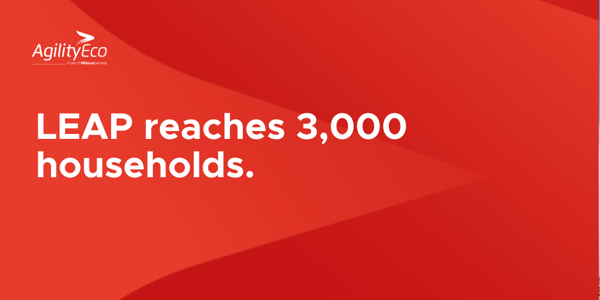LEAP (Local Energy Assistance Programme) reaches 3,000 households
28 June 2017

AgilityEco’s fully funded, council-led, national fuel poverty outreach service achieves a major milestone AND triples in scale for 2017-2018
AgilityEco is delighted to announce that its LEAP (Local Energy Advice Programme) service has received 3,000 applications in its first six months. LEAP is a free of charge service offered by local authorities and social landlords to fuel poor and vulnerable residents, offering them important advice, support and free energy saving measures.
LEAP was funded during this initial period by SSE and ScottishPower, as part of their Warm Home Discount (WHD) obligation. Both companies have kindly reaffirmed their funding for the forthcoming period, and they have been joined by several other energy companies including First Utility, Flow Energy and Co-op Energy. Working with AgilitySurvey, Groundwork, Energy Projects Plus, IncomeMax, and several other local community organisations, LEAP aims to support more than 8,000 households in the next nine months by delivering free energy saving advice, simple practical measures, additional income, and vulnerability support.
To date, 45 local authorities and social landlords have partnered with AgilityEco to provide LEAP to eligible residents in their local neighbourhoods. More than 1,900 home visits have already taken place since January and with more councils joining from September, LEAP is looking to triple the size of the current scheme to reach thousands more households over the coming months. LEAP already covers a wide geographical area including: Portsmouth, Enfield, Peterborough, Devon, Bournemouth, Poplar, Oxford, Merseyside, Cheshire, Walsall, Wrexham and South Ayrshire.
How LEAP works with local councils to support households that need extra help
Frontline workers in each local authority and their network of local partners are fully trained by LEAP to explain the scheme to households and refer them into the LEAP service. Those who are found to be eligible during a short initial call then receive a free home visit from a LEAP Home Energy Advisor.
During the LEAP home visit, households are provided with energy efficiency advice. LEAP Home Energy Advisors are trained to find and remedy obvious energy wastage in the house by fitting suitable energy saving devices such as radiator panels, chimney balloons, LED light bulbs, and door and window draught-proofing. Where appropriate, larger energy efficiency measures such as top-up loft insulation are dealt with in a second visit.
Households are also helped with energy bill problems, supported to switch to a cheaper energy tariff through the LEAP energy price comparison website, and assisted to apply for Warm Home Discount. Households that require further financial help are referred to IncomeMax for an entitlement check, often leading to extra benefits being identified, or debt assistance being provided.
LEAP Home Energy Advisors look for any additional vulnerability in the household during the home visit such as hazards, or signs that residents are struggling to cope in their own home. They also check that smoke alarms are working. Residents with vulnerability issues are referred for further assistance from the Council, housing association, fire service, or a local charity.
Warm homes in winter and huge savings all year
In addition to experiencing warmer, cosier and more comfortable homes during the winter months, individuals who have had a LEAP visit have enjoyed significantly lower energy bills as a result of the energy efficiency measures and switching to a cheaper energy tariff. Real-life examples include Mrs K in Peterborough who has made an annual saving of over £600. Simple measures such as LED bulbs were installed, and Mrs K has also been referred to IncomeMax for further eligibility checks.
Devon resident Mrs S qualified due to her low income status and her Home Energy Advisor talked her through her bills, helping her to understand what she was paying for and how much it cost per month. Her payments with the energy supplier were reduced by checking the tariffs and it was discovered that Mrs S was due a credit of £666.


